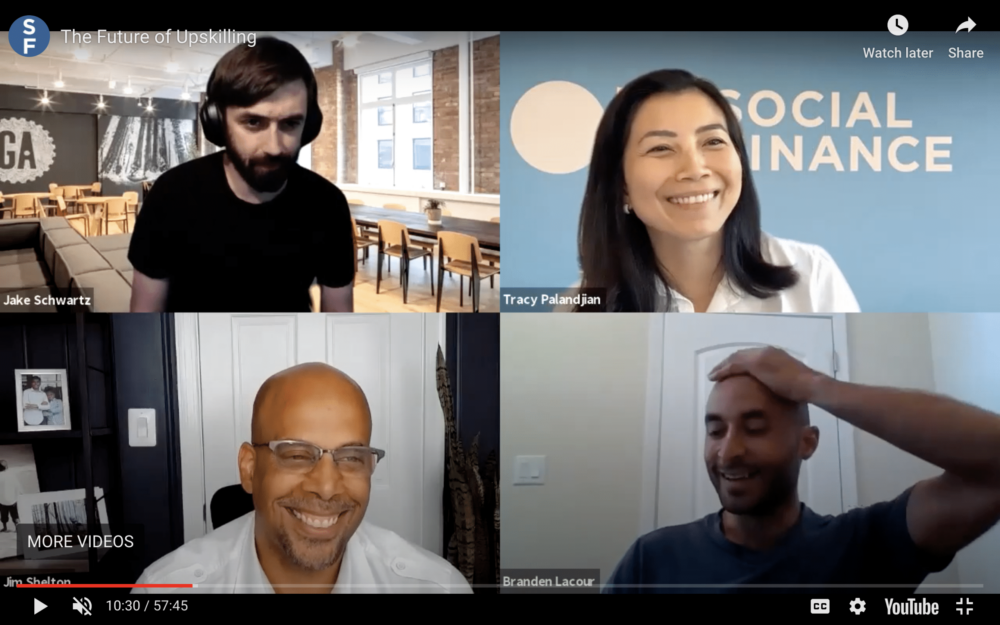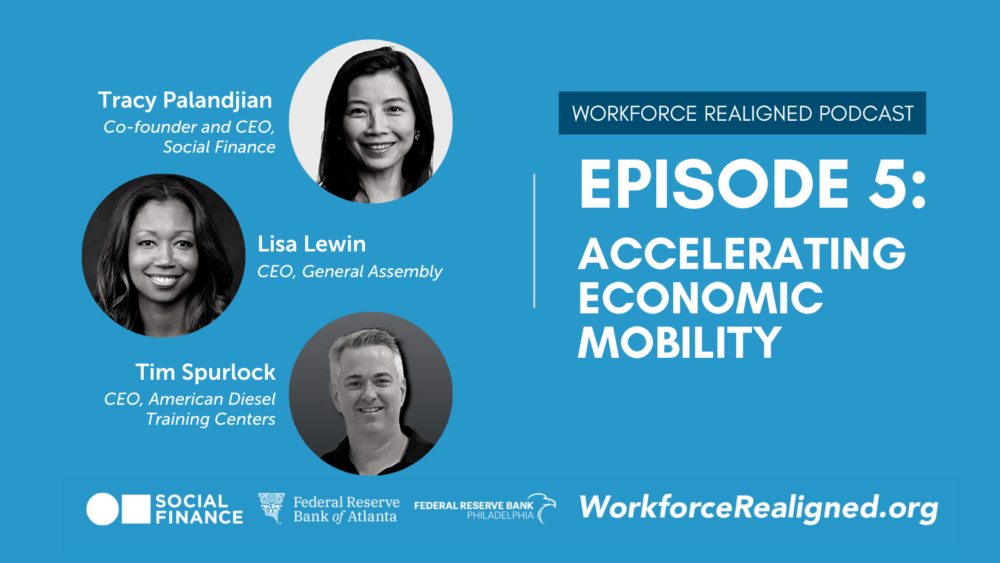

Impact Investments, Workforce & Economic Mobility
On Aug. 20, Blue Meridian Partners, General Assembly, and Social Finance hosted a webinar on the Career Impact Bond, an impact-first, student-friendly financing tool that helps people who are underemployed or unemployed access career training and get good jobs.
Blue Meridian Partners Chief Investment and Impact Officer Jim Shelton moderated the conversation, which included General Assembly Co-Founder and outgoing CEO Jake Schwartz, Social Finance CEO Tracy Palandjian, and Branden, a General Assembly Career Impact Bond graduate and software engineer at HGS Digital in Chicago.
Watch the full webinar:
Shelton, formerly the Deputy Secretary of the U.S. Department of Education, began by providing some important context on the current education and job training landscape: Both public and private institutions are paid for getting students in the door, but are not similarly incentivized to achieve key student outcomes like graduation or job placement.
We have lots of reasons to be proud of higher education,” Shelton said. “We created a system to create real pathways to upward mobility built into our middle class. And we created real on-ramps for access for many people and we forgot one really important thing: graduation. The mechanism for financing schools today allows people to get paid whether students actually get a good outcome or not. The question is, can you realign the incentives so that the students’ best outcome is the best outcome for the institutions?
The Career Impact Bond is designed to realign incentives to achieve the best outcomes for students like Branden, who kicked off the discussion by talking about his past life as a part-time bartender and engineer.
The student experience
Branden had cultivated self-taught engineering skills but needed more formal training to move into a full-time software engineering role. He had applied to enter General Assembly’s Software Engineering Immersive but was declined due to poor credit. But Branden reapplied and got accepted through the Career Impact Bond. He began classes in December 2019, graduated in March, and was hired at HGS Digital in May with a starting salary that nearly doubled his income.
During the webinar, Branden described the rigor of the program at GA, along with the career supports that helped him land a job soon after graduation. He also talked about his career coach, Chelsie Noble, who helped him with his resume and portfolio, and prepared him for interviews and salary negotiations.
A new model for education financing
Palandjian followed with a description of the Career Impact Bond: “We start with real-time labor market data to see where the jobs are. We target high-growth industries and high-performing training providers like General Assembly, and then we find the impact investors to cover a portion of the tuition cost and fund important wraparound support services. The capital from the impact investors enables students like Branden to enroll with no upfront cost. Those who get good jobs, and importantly, those who keep these good jobs with salaries over a particular income threshold repay the program costs as a fixed portion of their income over the next few years. Those who don’t get a job, or those who don’t get a job that pays over that threshold owe nothing.”
The Career Impact Bond includes student-friendly terms and protections provided under the Student Bill of Rights, including payment caps and fixed repayment terms with no extensions.
Schwartz then talked about how the Career Impact Bond financing model matches General Assembly’s mission. “We want to create accessible paths for people to get onto career trajectories that are growing that are exciting and inspiring for the students, and that have a future and are part of the new economy.”
The panelists closed out the webinar by addressing specifics about the model, including the payment terms. On the financing, Branden, who is currently making more than $70,000 per year, explained, “Even at $50,000 I would still be better off than where I was, still paying 10% [of my salary].”
As the job market changes, we need tools like the Career Impact Bond that help workers like Branden find pathways to careers in high-growth fields such as information technology, health care, and green energy, and ultimately achieve real economic mobility.
Watch webinar highlights:
Related Insight

JFF Horizons: Candid Conversations
General Assembly CEO Lisa Lewin and Social Finance CEO Tracy Palandjian discuss how the Career Impact Bond promotes economic mobility in our ever-changing economy.

Workforce Realigned Podcast, Episode 5: Accelerating Economic Mobility
In this podcast episode, Social Finance CEO Tracy Palandjian, General Assembly CEO Lisa Lewin, and American Diesel Training Centers CEO Tim Spurlock discuss closing the skills gap and rethinking the way we finance worker training…